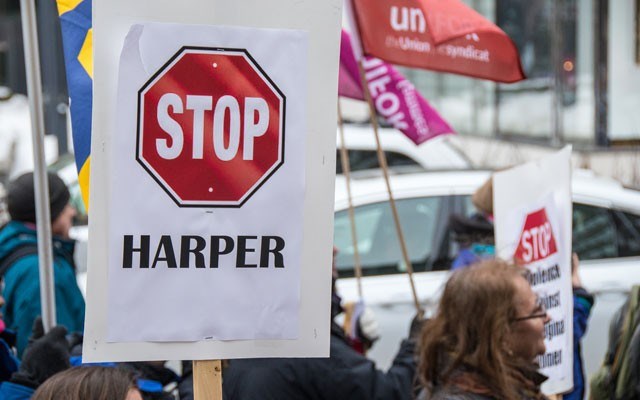As you drive the streets of Vancouver in the halcyon days of the post-Harper era, one thing is apparent: the election signs may be gone, but the sentiment that ousted the most reviled politician in Canadian history remains on glorious display thanks to an unlikely mass-produced icon — the Stop Harper sign.
Born of a sticker reading "Harper" that could transform a mere traffic sign into a powerful political statement, these symbols are to be found everywhere across the country, bringing smiles to the faces of those who fought the battle they evoke. They are as close to a revolutionary icon as Canada will ever have — our Che Guevara moment. As such, lest we forget the tyranny, they should be celebrated and preserved, disappearing only with time and entropy.
For those who missed the movement's heroic antecedent, here's the Coles notes version: white-gloved parliamentary page Brigette DePape held a "Stop Harper" sign up to television cameras recording the Harper government's first throne speech after the 2011 election. She was marched out of the chamber and subsequently fired. "Harper's agenda is disastrous for people who are living in Canada as well as for my generation," said the then-21-year-old University of Ottawa graduate to the CBC of her decision to put her job on the line to stage silent protest. Widely celebrated by Canadian progressives, American filmmaker Michael Moore called DePape's actions a defining moment in Canadian politics. "For a young person to do that and to do it peacefully, and quietly and with grace, I thought it was a very powerful moment," said Moore to the Canadian Press. "Every now and then there is an iconic moment where an individual takes action, and it inspires others to think."
He was right. DePape inspired many to think. And some to act in following the symbolic protest. Because many cities called the stickers acts of vandalism and not free speech, I decided to delve further into the groundswell that culminated in Harper's triumphant ousting on Oct. 19 of this year. I had a friend introduce me to someone who put their own citizen-in-good-standing at risk by waging a years-long guerilla sticker war against the Conservative occupiers. I asked a lot of questions and I received some pretty interesting answers.
First of all, why did you do it?
"I felt it was my patriotic duty. Canada's corporate media were giving the Conservatives a free pass they never would have received in another democracy. It was strange. Almost criminal. It was clear that extraordinary measures would be required to get the message out, and that these would have to be relentless and in your face. People all over the country realized it. There was probably 100 different groups making stickers."
How'd you get them?
"Various ways. There was an underground network you could buy through, or online. Lots of stores sold them. Or you could make your own."
Where did you generally put them?
"I started with a few high-value targets — you know, busy intersections where maximum numbers of people would see the message. It served two purposes: reminding like-minded people out there to actively protest, and to piss off conservatives — which was much easier to do."
Did you stick with that program?
"Not so much. After a while, you see those stickers also got removed the most, and it was more interesting to put them in places where there were less viewers but the sight of the sticker would make more of an impression. Like... on those fold-out stop signs on school buses. That was my crowning achievement."
How did you get away with it if it was considered vandalism?
"I adopted a few rules early on: never let anyone else know what you were up to, never let anyone see you doing it, and never admit you had done anything."
A professor of politics was quoted saying that a random, unexpected encounter with a sticker on a stop sign was more likely to get your attention and embed its sentiment in your mind. Do you think the stickers impacted the election?
"As a grassroots movement that reflected the widespread grassroots sentiment to stopping Harper, they provided an effective counterpoint to the professionalization of mainstream campaigns — and proved all the corporate media in this country wrong. So... yeah, I do."




